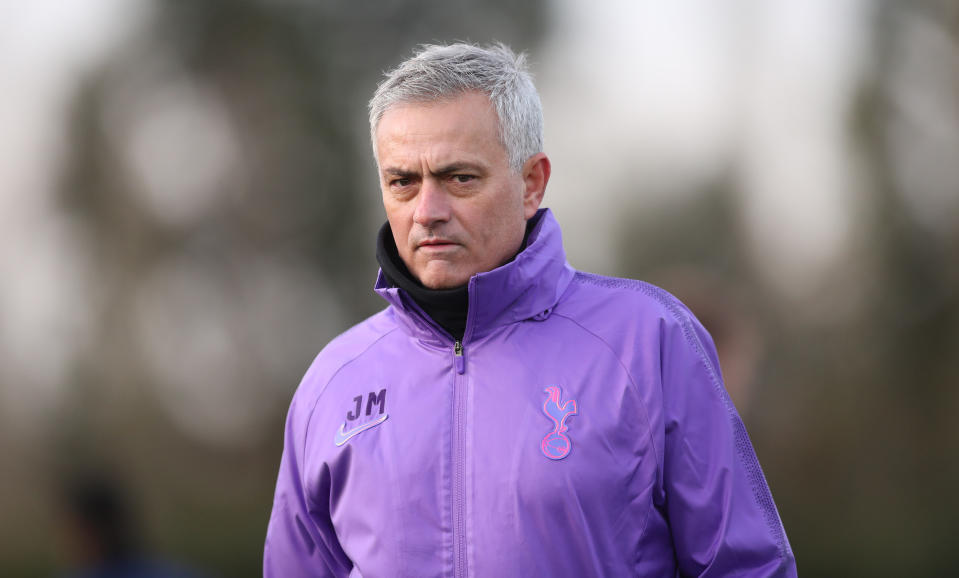Hard to see how Jose Mourinho will help Spurs before the inevitably messy ending
For the fourth time in his career, Jose Mourinho has been hired for a Premier League job. On Wednesday, Tottenham Hotspur installed the Portuguese in his ninth managerial position, following the instantly controversial sacking of Mauricio Pochettino on Tuesday.
Mourinho’s English appointments trace the arc of his much-discussed career, spanning from the cocky-yet-charming managerial prodigy upon his first appointment at Chelsea in 2004, to his return in 2013 as a highly decorated manager, to his 2016 arrival at Manchester United as both a three-time Premier League champion and damaged goods, to, now, a point where his signing by Spurs is widely considered a huge risk.
It is, any way you look at it, a strange marriage. Mourinho, somehow still only 56 and out of work for almost a year since his December firing by United, might well be the most divisive manager in the sport’s history. His personal trophy case is inarguable: three Premier League titles; two Serie A titles; a La Liga title; two Champions League trophies; two UEFA Cup or Europa League trophies; eight domestic cups. The thing is, Mourinho has provoked as many crises and skirmishes and meltdowns as he has won prizes. And you don’t get one without the other.
So for Spurs, of all teams, to hire him under the rule of the ever-sensible, risk-averse chairman Daniel Levy, feels like an odd fit.
But there are other pressing and worrying considerations.

The downturn in Pochettino’s last eight or so months in charge – the miraculous run to the Champions League final very notably excepted – was much to do with a widespread fatigue among the players, who slumped to their present 14th place in the league. Pochettino was a demanding manager, imposing a strict and imposing playing system. There is a habit among soccer teams to vacillate between opposites in your managerial hires. After the disciplinarian, you go with the nice-guy players’ manager to give the players a fresh experience. And then the cycle resets.
Yet Mourinho is no less demanding than Pochettino, albeit in different ways. Rather than a dogmatic, Marcelo Bielsa-inspired high press, Mourinho applies something antithetical, a sort of reactive non-press. But he drains his players in different ways. Mourinho creates a culture of perpetual tension through instigation and conflict.
That might not work particularly well on players who appear to be burned out as it is, while many of them were already itching to leave the club.
What’s more, Mourinho relies heavily on massive investment in his teams to solve problems, rather than developing existing players or ushering in academy products – although Mourinho has always disputed this reputation of ignoring youth, even if the stats clearly support it.
“The quality in both the squad and the academy excites me,” Mourinho said in a statement. “Working with these players is what has attracted me.”
[ Follow Yahoo Soccer on Twitter and Facebook ]
Yet historically, that’s not what he has actually ever done. It could be that he may have evolved during his time away from the game, mostly spent doing TV punditry in England, but that feels unlikely when you consider that Mourinho has replicated the same playbook everywhere he’s gone – until it stopped working, and then simply did it all over again someplace new. Mourinho would arrive, demand heavy spending on new players, foster urgency in a pressure-cooker environment, win a few major trophies, and move on when it all blew up.
But at Spurs, the institutional lack of investment in players drove Pochettino to despair – and it’s likely that the failure to refresh the squad caused its steep decline. It’s doubtful that Mourinho got concessions from Levy that he denied his predecessor.
Taken together, it’s hard to see how any of this ends very happily. Mourinho doesn’t give you happy endings. He gives you a few highs and then a crash.
And maybe that’s the plan. One of the many things that jarred about Pochettino’s firing is that the timing was so awkward – toward the end of an international break with almost no qualified managers available. But then maybe this is a short-term play. Veteran regulars Christian Eriksen, Toby Alderweireld and Jan Vertonghen all have expiring contracts. Perhaps hiring Mourinho is a last-ditch attempt to win something with a splendid, carefully cultivated squad before it inevitably breaks up.
Because the only structural problem Mourinho will solve in short order is the erosion of intensity. He isn’t a long-term solution because he doesn’t do the long term. He’s a fresh face, yet a familiar one.
“In Jose we have one of the most successful managers in football,” Levy said in the statement. “He has a wealth of experience, can inspire teams and is a great tactician. He has won honors at every club he has coached. We believe he will bring energy and belief to the dressing room.”
Belief? Perhaps.
Energy? Sure. But what kind, exactly?
Leander Schaerlaeckens is a Yahoo Sports soccer columnist and a sports communication lecturer at Marist College. Follow him on Twitter @LeanderAlphabet.
More from Yahoo Sports:

 Yahoo Lifestyle
Yahoo Lifestyle 
